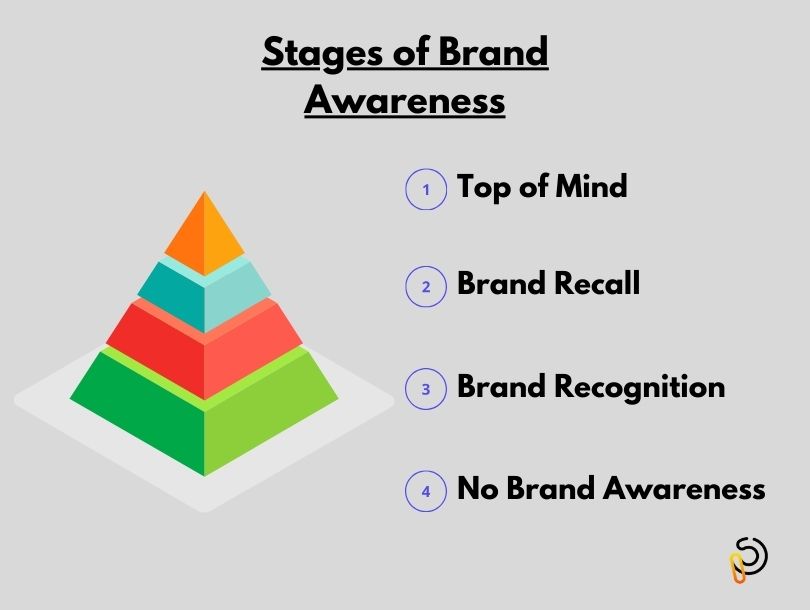Every brand wants to be the one the audience recognizes, remembers, and prefers in an ocean of online competitors. Accomplishing this means having your brand be the first name that comes to mind when people think of your industry.
Brand awareness is one of the most common goals in digital marketing because it translates into loyal customers and a stable market presence. You can think of it as the foundation of your brand’s reputation; without it, even the best products can remain hidden.
For example, Nike’s “Just Do It” campaign wasn’t just about selling shoes — it was about embedding the brand into the very mindset of motivation, fitness, and success. As all the popular taglines and campaigns run through your mind, you’re likely wondering what would work best for your business.
In this guide, you’ll learn how to use digital marketing to increase brand awareness and ensure customers remember your name.
What is Brand Awareness in Marketing?
Brand awareness in marketing is the power to make consumers instantly recognize and recall your brand in a crowded market. It’s the difference between being just another product on the shelf and the one everyone thinks of first.
In digital marketing, this term means strategically placing your brand in front of the right people through social media, SEO, content marketing, and paid ads. A solid brand awareness campaign ensures your logo, message, and values are instantly recognizable, building familiarity and trust in seconds.
It makes consumers reach for your product, even when countless alternatives are staring them in the face. This vital metric fuels customer loyalty and engagement while keeping sales stable.
In short, brand awareness turns your brand into the go-to solution consumers can’t ignore.

How to Increase Brand Awareness Through Digital Marketing
As every marketer, you likely want to know how to use digital marketing to increase brand awareness. The following strategies will help you accomplish that.
1. Experiment with Niche Community Platforms
Why follow the crowd when you can dominate niche community channels? These platforms offer higher-quality interactions and better brand visibility than the competitive, overcrowded social media platforms.
Most businesses overlook the power of spaces like Reddit, Quora, or industry-specific forums, where you can showcase your expertise in conversations laser-focused on your products or services.
In a world where over 70 percent of consumers say ads turn them off, these niche spaces create room for genuine, meaningful connections. Imagine a fitness brand jumping into health-focused forums, sharing workout tips and nutrition advice as a trusted resource instead of a hard-sell. The result? Subtle, authentic brand awareness that actually sticks.
2. Host Virtual Events and Webinars
According to the Content Marketing Institute, 51 percent of marketers said webinars delivered the best content marketing results over the past year. These virtual events are an excellent way to highlight your prowess and provide actionable value to your audience.
If you’re a software company, host a live tutorial to show how your platform skyrockets productivity. A skincare brand? Run an interactive virtual consultation and help your attendees solve their skin concerns in real time.
Promote these events through social media and email campaigns to expand your brand visibility, bringing people closer to what you offer. Use branded visuals and striking content during the sessions to leave an abiding impression, making sure people remember your brand long after the event wraps up.
3. Create Shoppable Content
Let customers buy straight from your posts and cut the path from brand awareness to conversion in half. Fashion brands nail this by showcasing stunning product images with clickable tags that lead directly to purchase pages.
As a result, you eliminate friction in the buyer’s journey and strengthen your brand’s visual impact. Shoppable content thrives on platforms like Instagram, Facebook, and Pinterest, where audiences crave visual storytelling and are ready to shop without leaving their feed.
The goal is to make the experience as smooth as possible and make your brand the destination, not just another stop along the way.
4. Develop Branded Content Series
Consistent storytelling, paired with weekly tips or podcasts, will keep your audience hooked and always coming back for more. Create regular content that hits every touchpoint to cement your brand’s message in their minds and build lasting engagement.
The episodic format gives your brand staying power, especially when each installment leaves them anticipating the next. For instance, brands like Red Bull are great at this, delivering a steady stream of extreme sports content that perfectly matches their high-energy, adventurous persona. This approach ensures your brand isn’t just remembered but actively sought out.
5. Collaborate on Interactive Tools or Quizzes
Addictive, shareable content nudges engagement and boosts brand awareness. Picture a beauty brand teaming up with an influencer to create a “Find Your Perfect Skincare Routine” quiz. This will entice users to get their results and share them with their makeup-enthusiast friends. Beyond the fun, these quizzes drive traffic to your website and provide another valuable touchpoint for brand recognition. But it’s not enough to be catchy. Your content needs to be informative, personalized, and entertaining, ensuring your brand becomes synonymous with both value and enjoyment.
6. Hyper-Personalized Email Marketing Campaigns
Email marketing may be everywhere, but hyper-personalization is your safe way to stand out. Move beyond the basics and segment your audience by behavior, preferences, and past purchases to create messages that speak directly to their needs.
If you run a fashion brand, send personalized recommendations based on each customer’s browsing history or purchase patterns. This approach shows you see your customers as individuals, not just data points, resulting in stronger personal connections that drive loyalty.
After all, it’s not just about selling but about making your customers feel understood and valued.
7. Leverage Google Ads with Smart Bidding for Awareness
You can leverage Google Ads‘ smart bidding to focus your campaigns on brand awareness by targeting the top of the funnel. This strategy puts your brand in front of highly relevant users who might not even know you exist yet.
Display ads are a perfect fit for this, as they allow you to target people actively researching keywords tied to your products or services. Thanks to this, your brand will pop up early in their journey and start the process of recognition before they explore other options.
8. Use TikTok for Viral UGC Campaigns
If you want videos to work in your favor, you must use TikTok for your business. After all, this app has a relatively friendly algorithm that gives visibility to beginners as long as their content is high-quality and drives engagement.
You can launch a branded hashtag challenge or inspire users to feature your product in their own videos. This worked more than well for Chipotle after they started the #GuacDance challenge and nudged users to create videos dancing for free guacamole, smashing TikTok records.
9. Consider Podcast Sponsorships
Often considered the new mass medium, podcasts reached over 546 million listeners worldwide in 2024 and that number is set to soar beyond 651 million by 2027. Yet, many businesses overlook podcast sponsorships as a game-changing way to amplify brand awareness. Sponsoring the right podcasts puts your brand right in front of an engaged, loyal audience, often sparking authentic endorsements from trusted voices.
Imagine you run a tech startup. You can sponsor a popular entrepreneurship podcast and have the host subtly highlight your brand’s mission and services to an audience already tuned in for innovation.
10. Strategic Co-Branding for Startups
Co-branding is among the most underrated strategies for effective startup branding despite its potential to unite two companies and double their audience reach. Imagine all the perks of finding a complementary brand and creating a joint product or campaign.
Each brand benefits from the other’s reputation, turning brand awareness into a shared win. Plus, co-branding often generates buzz and draws in followers from both sides, catching the eye of the press and sparking influencer interest.
11. Launch an eBook
As the AI boom floods the internet with shallow content, in-depth, well-researched material is becoming an increasingly rare commodity. However, that scarcity makes it more valuable than ever.
Creating an eBook will not only establish your brand as a thought leader but also allow you to explore complex topics that short-form content can’t. This is your chance to demonstrate your expertise and gift people with something that will remind them of your brand. Therefore, offering a free eBook does more than just deliver insight.
It’s also an excellent lead magnet that gives access to email addresses and grows your mailing list. At the same time, it deepens your audience’s awareness of your brand and solidifies your authority in the market.
12. Increase Your SEO Efforts
SEO will never cease being the backbone of making your brand visible on search engines like Google. While refining on-page SEO (content, metadata, and keywords) is essential, off-page SEO (backlinks and social shares) is just as necessary.
Together, these two form the must-have duo that places your brand in search results when users look up relevant terms. Neglecting either one risks your brand being buried beneath competitors.
13. Try Guest Posting
Why not tap into the audience of established websites to expand your brand awareness? Contribute high-quality articles to reputable blogs in your industry to expose your brand to readers who may not yet know you. This strategy broadens your reach but also positions you as a trusted voice in your field. Moreover, you gain valuable backlinks that reinforce your SEO, boosting your credibility through association with recognized names.
14. Write Helpful and Engaging Blog Posts
Blogging is still among the best ways to get your name out there and deliver value to your customers. Use it to instill trust and ensure people remember your brand through informative content that tackles specific concerns and needs.
15. Create Targeted Landing Pages
Design customized pages that convert specific audiences based on their interests, behaviors, or demographics. Rather than settling for a generic homepage, a targeted landing page may center around a particular product, promotion, or customer segment.
However, you must hone in on what matters to your audience to genuinely improve your brand’s relevance and connection. Plus, targeted landing pages boost your Quality Scores, paving the way for more effective SEO and PPC strategies.
Can Social Media Marketing Increase Brand Awareness?
Social media marketing is one of the most effective strategies for increasing brand awareness, as it allows you to reach a highly targeted audience on the platforms they frequent most. Instagram, TikTok, and LinkedIn enable precise targeting that ensures your posts and ads find the right demographics.
These platforms have an interactive nature, meaning every like, share, and comment pushes your brand further into users’ feeds. This is especially true for TikTok, the app synonymous with viral content. As a result, one well-executed hashtag challenge can put your brand in front of millions almost instantly.
Branded hashtags should always accompany your content, as they make users more likely to share it. Organic and user-generated content are just two ways to thrive on social media.
If your posts and campaigns are visually striking, paid ads can amplify your reach and help more people discover your products. Instagram’s shoppable posts, for instance, turn social media browsing into direct brand interactions, translating into exposure and conversions.
Another way to expand your reach is by collaborating with influencers. The goal of these collaborations is to lend credibility and introduce your business to a broader, pre-engaged audience.
Conclusion
Over 80 percent of consumers need to trust a brand to consider buying from them. This is among the key reasons brand awareness must be at the center of your digital marketing efforts. However, many businesses struggle to get customers to associate their name with the desired product.
If you still have doubts about how to use digital marketing to increase brand awareness, you may want a team to guide you through the process. In this case, collaborating with professionals who offer digital marketing services can help you achieve your goals.





